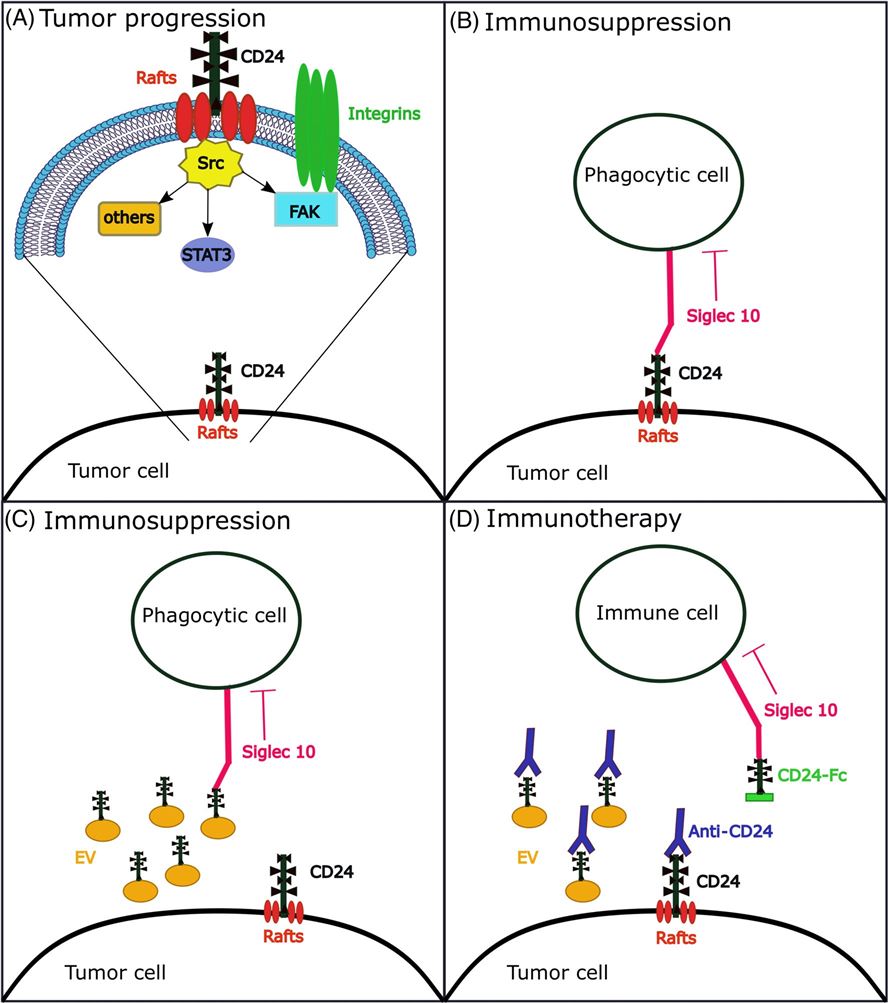CD24-Expressed Exosome Modification Service
Overview Services Features FAQs
Overview
CD24 is a highly glycosylated adhesion protein, anchored to the cell membrane via glycosyl-phosphatidyl-inositol, without a transmembrane domain. It plays a critical role in suppressing excessive immune responses and is overexpressed in various cancers, where it promotes tumor growth, proliferation, and metastasis while inhibiting apoptosis. CD24 binds to the Siglect-10 receptor on tumor-associated macrophages, preventing phagocytosis and aiding immune escape. Blocking the CD24/Siglec-10 interaction can restore macrophage phagocytosis and target tumor cells.
In a different context, CD24 can be used in drugs that are not intended to be cleared by the body. Some researchers have proposed modifying CD24 on exosomes to inhibit their uptake by phagocytes, thereby improving the efficiency of exosome delivery to target organs. This modification can enhance the utilization of exosomes as drug-delivery vehicles. Creative Biolabs offers the design of CD24-expressed exosomes for customers to significantly enhance their therapeutic potential.
 Fig.1 The functional role of CD24 in oncoimmunology.1,2
Fig.1 The functional role of CD24 in oncoimmunology.1,2
Services
Currently, we have developed two exosome surface engineering strategies for the design of CD24-expressing exosomes:
-
Fusion expression with exosome membrane-localized protein: This strategy involves fusing CD24 with proteins abundant on the surface of exosome membranes, such as Lamp2b, CD63, or PDGFR, to achieve overexpression of CD24 on the exosome surface.
-
Post-isolation modification of exosomes: This strategy includes several combined approaches. The first approach inserts lipid-conjugated CD24 onto phospholipids in exosomes. The second method combines CD24 and exosomes using different linker molecules that can bind to each other, then connects CD24 to the exosome surface through chemical conjugation methods such as click chemistry. The third approach conjugates biotin on the exosome surface. Due to the high binding affinity between streptavidin (SA) and biotin, SA-coupled CD24 can bind to the exosome surface.
Features
-
Innovative exosome surface engineering
-
Flexible exosome modification strategies
-
Expert consultation and support
-
Comprehensive quality control
Creative Biolabs is the world's leading technical service provider in the field of exosomes and has always been committed to continuously launching new technologies around customer needs. We have established a stable and mature exosome engineering transformation platform, which can construct innovative CD24-expressed exosomes for customers through endogenous modification or exogenous modification and verify its anti-phagocytosis ability in vivo and in vitro. In addition, we can also provide customers with a full range of engineered exosome solutions through leading exosome isolation and identification tools and innovative high-throughput multi-omics solutions. If you are interested in CD24-expressed exosomes, please contact us to put forward your specific needs so that our team can develop an experimental plan for you more quickly.
FAQs
Q: What are the benefits of using CD24-expressing exosomes for therapeutic applications?
A: CD24-expressing exosomes have enhanced anti-phagocytic properties, which help them evade immune clearance and increase the efficiency of delivering therapeutic agents to target cells.
Q: What is the difference between endogenous and exogenous modification of exosomes?
A: Endogenous modification involves genetically modifying donor cells to produce CD24-expressing exosomes naturally, while exogenous modification involves chemically adding CD24 to exosomes after they are isolated from donor cells.
Q: What kind of quality control measures are in place for CD24-expressing exosomes?
A: We implement comprehensive quality control procedures, including verification of CD24 expression levels, exosome purity, and functional testing, to ensure the highest quality and consistency of the product.
References
-
Altevogt, P.; et al. Novel insights into the function of CD24: A driving force in cancer. International Journal of Cancer. 2021, 148(3):546-559.
-
Distributed under Open Access license CC BY 4.0, without modification.
For Research Use Only. Cannot be used by patients.
Related Services:

 Fig.1 The functional role of CD24 in oncoimmunology.1,2
Fig.1 The functional role of CD24 in oncoimmunology.1,2









